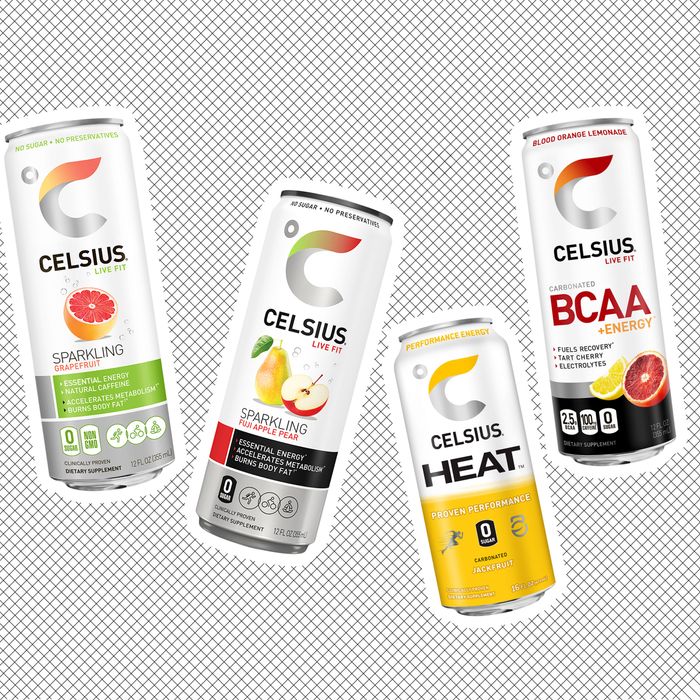
Alongside decorative cell-phone straps and Instagram photo dumps, the latest qualifying signifier of trendiness is, weirdly, an energy drink. Celsius (essentially Red Bull marketed as a form of wellness) has popped up on my TikTok feed, in the check out lines of overly expensive grocery stores, in the hands of my coolest friends, and was even given a glowing review by Zen guy Jonah Hill. It’s everywhere. While I’ve never enjoyed an energy drink in my life, I was intrigued by the brand’s seemingly quick rise in popularity (it has actually been around since 2005) and all of its marketed health benefits, so for one weekend in September, a month that begs you to try new things and refresh your routine, I decided to switch out my daily coffee for one of these cans of fitness culture and caffeine.
The first morning of my Celsius experiment, I tried the Watermelon flavor with my brother. He is a connoisseur of trends himself and hates coffee, so he was more than happy to join me. We also added hummus toast to our breakfast, creating the perfect influencer aesthetic, which felt ridiculous but fun, like participating in most popular and mostly harmless trends feels. Upon my first sip, I knew I wasn’t drinking something I’d ever recommend to someone else. It tasted like a La Croix, but flatter in its carbonation, and with an intense but less appetizing aftertaste I can only describe as “liquid battery.” My brother felt the same way, but after finishing his drink, he did immediately and randomly ask me, “Wouldn’t it be cool if there was some kind of fast casual restaurant for toast?” His question made me wonder about the power of Celsius: was his idea good, or were we overcome by the thrill of being a part of optimization culture? Probably the latter, but either way, it was enough to keep me drinking Celsius through the weekend.
Later that day, I had a second can. This time it was the Orange flavor, which of the ones I tried, I liked the best. It tasted the least artificial, and because I was drinking it in the afternoon rather than first thing in the morning, its energy-drink pungency was also less disgusting. While I still wasn’t completely sold on it, I will admit it gave me a nice afternoon kick, and honestly I felt kind of cool carrying it around. The packaging of Celsius, if it wasn’t so recognizable right now, would normally not appeal to me at all (I’m personally not one for commodifying fitness, and that seems to be the brand’s whole thing), but being seen with the can felt like communicating to the world that I have my life together, something an afternoon coffee could sadly never fake.
On Sunday, I tried my final can, the Wild Berry flavor. While I thought I was saving the best for last, it was by far the least palatable. Like the other two, it lacked carbonation, but the flavor itself was the worst part — it tasted like a melted Blow Pop in a can, or an old Jolly Rancher. By that point, the novelty of my experiment had also worn off, and I was just ready for it to be over. The only thing left to consider was whether my weekend supplement was actually good for my diet and lifestyle, like Celsius tries to convince its consumers. Was I better than everyone else for drinking a glorified Monster Energy?
Unlike most energy drinks, which seem to almost play into the idea of being terrible for you, Celsius markets itself as a “movement that’s all about movement” which doesn’t entirely make sense, but basically it’s a work out supplement, dietary supplement and energy drink all in one. Celsius claims to give its consumers “healthy energy” (as they put it on their cans) with Vitamins B and C and ingredients like green tea extract and ginger root which are supposed to boost metabolism and help digestion. I decided to ask a doctor whether I should permanently switch to the buzzy beverages, and the conclusion was an unsurprising: no. While Celsius’s peddling of health benefits isn’t necessarily false information, Dr. Frank LoVecchio, a medical toxicologist and both the medical director of clinical research and a professor at Arizona State University, assured me I’m better off sticking with coffee, if that’s what I prefer. “[Coffee and Celsius] have similar amounts of caffeine. Most people in the United States don’t need vitamin supplementation, because they get most of it from their diet,” he says, “It’s always better to get your vitamins from your diet than just taking a pill or something synthesized in a lab.”
Dr. LoVecchio further advised that Celsius is probably no better than just drinking any other energy drink after taking a multivitamin. Even with all of Celsius’s claims of boosting metabolism and improving efficiency in workouts, LoVecchio says if you drank the same amount of caffeine in another drink, it would provide the same benefits. Additionally, as with everything, he reminded me that all caffeine consumption should be taken in moderation, and if you are a Celsius lover, you probably shouldn’t drink more than one can per day. I personally don’t think I’ll ever willingly drink a Celsius again, but it was fun to switch up my routine for a few days and feel like I was as hip as all the people who swear by it, which is the real allure of anything trendy. Who knows? Talk to me in a month. Maybe I’ll be recommending it. Blame it on the algorithm.
"drink" - Google News
September 23, 2021 at 01:15AM
https://ift.tt/3nUNvIN
Why Is Everyone Drinking Celsius? - The Cut
"drink" - Google News
https://ift.tt/2STbaKe
https://ift.tt/2VWmZ3q
Bagikan Berita Ini














0 Response to "Why Is Everyone Drinking Celsius? - The Cut"
Post a Comment